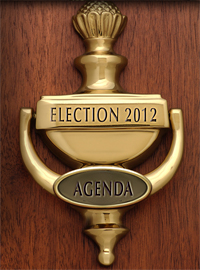
|
If anything...2012 should be an even greater opportunity for Republicans than 1992 was for Democrats.
|
|
| The 2012 presidential race is shaping up to be a supremely bizarre affair. With Barack Obama nearly two and a half years into his term of office, two things are crystal clear about his presidency. First, his policy instincts run counter to virtually every tenet of conservative thought. Obama’s ideal nation is one of higher taxes, greater spending, expanded entitlements, a smaller military, broader regulation and expanded federal influence in the lives of everyday Americans. Second, this litany is not popular. After an initial honeymoon, Obama’s approval ratings hit the 50 % mark less than a year into his presidency. They have hovered at or below that rate for nearly the entire period since.
Yet despite this seeming vulnerability, a host of the most talented politicians in the Republican Party are avoiding challenging Obama for reelection. Last weekend’s announcement that Indiana Governor Mitch Daniels would be sitting out the race was only the most recent in a string of pronouncements that have included Mike Huckabee, Haley Barbour, John Thune, Mike Pence and even the inescapable Donald Trump.
The remaining field is invoking comparisons to 1992, when a string of major Democrats opted against challenging President George H.W. Bush in light of the massive approval ratings he enjoyed in the aftermath of the first Gulf War. Of course, that year is instructive. Despite being on virtually no Beltway pundit’s A-list, Bill Clinton rose from relative obscurity to ensure that the Bush presidency was a one-term affair.
If anything, however, 2012 should be an even greater opportunity for Republicans than 1992 was for Democrats. Bush did not present a stark philosophical contrast for Democrats, especially not for a centrist candidate like Clinton. The president who increased taxes, signed sweeping big-government legislation like the Clean Air Act amendments and the Americans with Disabilities Act and pursued an internationalist, consensus-driven foreign policy was hardly the second coming of Barry Goldwater.
Obama, however, provides such a contrast, having brought every instinct of big-government liberalism to bear in one of the most activist terms in presidential history. Thus, while the shape of the Republican presidential field remains amorphous, its ultimate goals should not be.
Begin with the economy. Obama envisions higher taxes. The GOP should support lower, flatter taxes that can jumpstart prosperity and increase government revenues through a combination of increasing per capita income and broadening the tax base rather than increasing tax rates. Obama wants broad swaths of government power to operate through the bureaucracies of cabinet departments like Health and Human Services and the Interior. Republicans should advocate for returning power from unelected functionaries to members of the legislative branch who can be held accountable at the ballot box. And they should insist that all federal regulation pass through a rigorous cost-benefit analysis instead of perpetuating the fiction that government can reorganize the economy free of cost.
Obama pays lip service to the idea of debt reduction, yet continues one of the most aggressive federal spending binges in history. Though the next Republican president likely won’t have the option of the line-item veto that is available to nearly all of the nation’s governors, he could find alternative ways of skinning that cat. One possible solution would be to announce a hard cap on the acceptable level of federal spending and promise to veto any budget that exceeds it. Of course, a future Republican president would also have to deal with entitlement reform, an issue best addressed through the bold reforms already proposed by House Budget Committee Chairman Paul Ryan.
Obama is currently mired in three unsatisfactory wars, the latest of which (the conflict in Libya) is a case study in the deficiencies of excessive reliance on international coalition-building. Obama’s Republican opponent would do well to propose an attitude toward military force that is less expansive but more effective. That would mean reducing the use of large ground forces for expansive missions with uncertain goals while increasing the limited use of unambiguously deadly force to achieve clearly defined objectives with tangible connections to America’s national security interests.
Finally, Obama finds a justification for expanding the federal government in every American hardship, real or imagined. The GOP nominee should take the opposite tact, even going so far as to abolish needless cabinet departments, consolidate the functions of others, and devolve power back to the states in accordance with the Tenth Amendment.
The road ahead for the Republican presidential nominee will be tough. Barack Obama is a talented campaigner with rhetorical and financial gifts. He also enjoys all of the inherent advantages of incumbency. Devising an effective strategy to combat these attributes will be difficult. But should a Republican emerge victorious on Election Day 2012, his mandate going forward will be substantially easier to divine. It will be to embrace free markets, national strength and personal liberty. In essence, it will be to restore America’s trajectory towards national greatness. |

























